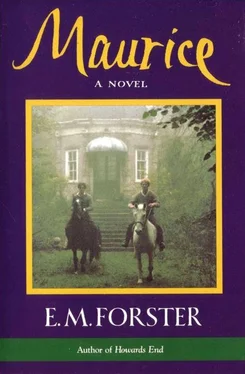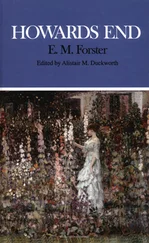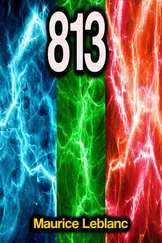Meanwhile, he had received letters from Clive, but they always contained the sentence, "We had better not meet just yet." He grasped the situation now — his friend would do anything for him except be with him; it had been thus ever since the first illness, and on these lines he was offered friendship in the future. Maurice did not cease to love, but his heart had been broken; he never had wild thoughts of winning Clive back. What he grasped he grasped with a firmness that the refined might envy, and suffered up to the hilt.
He answered these letters, oddly sincere. He still wrote what was true, and confided that he was unbearably lonely and should blow out his brains before the year ended. But he wrote without emotion. It was more a tribute to their heroic past, and accepted by Durham as such. His replies were unemotional also, and it was plain that, however much help he was given and however hard he tried, he could no longer penetrate into Maurice's mind.
27
Maurice's grandfather was an example of the growth that may come with old age. Throughout life he had been the ordinary business man — hard and touchy — but he retired not too late, and with surprising results. He took to "reading", and though the direct effects were grotesque, a softness was generated that transformed his character. The opinions of others — once to be contradicted or ignored — appeared worthy of note, and their desires worth humouring. Ida, his unmarried daughter, who kept house for him, had dreaded the time "when my father will have nothing to do", and herself impervious, did not realize that he had changed until he was about to leave her.
The old gentleman employed his leisure in evolving a new religion — or rather a new cosmogony, for it did not contradict chapel. The chief point was that God lives inside the sun, whose bright envelope consists of the spirits of the blessed. Sunspots reveal God to men, so that when they occurred Mr Grace spent hours at his telescope, noting the interior darkness. The incarnation was a sort of sunspot.
He was glad to discuss his discovery with anyone, but did not proselytize, remarking that each must settle for himself: Clive Durham, with whom he had once had a long talk, knew as much about his opinions as anyone. They were those of the practical man who tries to think spiritually — absurd and materialistic, but first hand. Mr Grace had rejected the tasteful accounts of the unseen that are handed out by the churches, and for that reason the hellenist had got on with him.
Now he was dying. A past of questionable honesty had faded, and he looked forward to joining those he loved and to be joined in due season by those whom he left behind. He summoned his late employees — men without illusions, but they "humoured the old hypocrite". He summoned his family, whom he had always treated well. His last days were very beautiful. To inquire into the causes of beauty were to inquire too closely, and only a cynic would dispel the blended Sorrow and Peace that perfumed Al-friston Gardens while a dear old man lay dying.
The relations came separately, in parties of two and three. All, except Maurice, were impressed. There was no intrigue, as Mr Grace had been open about his will, and each knew what to expect. Ada, as the favourite grandchild, shared the fortune with her aunt. The rest had legacies. Maurice did not propose to receive his. He did nothing to force Death on, but it waited to meet him at the right moment, probably when he returned.
But the sight of a fellow-traveller disconcerted him. His grandfather was getting ready for a journey to the sun, and, garrulous with illness, poured out to him one December afternoon. "Maurice, you read the papers. You've seen the new theory — " It was that a meteor swarm impinged on the rings of Saturn, and chipped pieces off them that fell into the sun. Now Mr Grace located the wicked in the outer planets of our system, and since he disbelieved in eternal damnation had been troubled how to extricate them. The new theory explained this. They were chipped off and reabsorbed into the good! Courteous and grave, the young man listened until a fear seized him that this tosh might be true. The fear was momentary, yet started one of those rearrangements that affect the whole character. It left him with the conviction that his grandfather was convinced. One more human being had come alive. He had accomplished an act of creation, and as he did so Death turned her head away. "It's a great thing to believe as you do," he said very sadly. "Since Cambridge I believe in nothing — except in a sort of darkness."
"Ah, when I was your age — and now I see a bright light — no electric light can compare to it."
"When you were my age, grandfather, what?"
But Mr Grace did not answer questions. He said, "Brighter than magnesium wire — the light within," then drew a stupid parallel between God, dark inside the glowing sun, and the soul, invisible inside the visible body. "The power within — the soul: let it out, but not yet, not till the evening." He paused. "Maurice, be good to your mother; to your sisters; to your wife and children; to your clerks, as I have." He paused again and Maurice grunted, but not disrespectfully. He was caught by the phrase "not till the evening, do not let it out till the evening." The old man rambled ahead. One ought to be good — kind — brave: all the old advice. Yet it was sincere. It came from a living heart.
"Why?" he interrupted. "Grandpapa, why?"
"The light within —"
"I haven't one." He laughed lest emotion should master him. "Such light as I had went out six weeks ago. I don't want to be good or kind or brave. If I go on living I shall be — not those things: the reverse of them. I don't want that either; I don't want anything."
"The light within —"
Maurice had neared confidences, but they would not have been listened to. His grandfather didn't, couldn't understand. He was only to get "the light within — be kind", yet the phrase continued the rearrangement that had begun inside him. Why should one be kind and good? For someone's sake — for the sake of Clive or God or the sun? But he had no one. No one except his mother mattered and she only a little. He was practically alone, and why should he go on living? There was really no reason, yet he had a dreary feeling he should, because he had not got Death either; she, like Love, had glanced at him for a minute, then turned away, and left him to "play the game". And he might have to play as long as his grandfather, and retire as absurdly.
28
His change, then, cannot be described as a conversion. There was nothing edifying about it. When he came home and examined the pistol he would never use, he was seized with disgust; when he greeted his mother no unfathomable love for her welled up. He lived on, miserable and misunderstood, as before, and increasingly lonely. One cannot write those words too often: Maurice's loneliness: it increased.
But a change there had been. He set himself to acquire new habits, and in particular those minor arts of life that he had neglected when with Clive. Punctuality, courtesy, patriotism, chivalry even — here were a few. He practised a severe self-discipline. It was necessary not only to acquire the art, but to know when to apply it, and gently to modify his behaviour. At first he could do little. He had taken up a line to which his family and the world were accustomed, and any deviation worried them. This came out very strongly in a conversation with Ada.
Ada had become engaged to his old chum Chapman, and his hideous rivalry with her could end. Even after his grandfather's death he had feared she might marry Clive, and gone hot with jealousy. Clive would marry someone. But the thought of him with Ada remained maddening, and he could scarcely have behaved properly unless it had been removed.
Читать дальше












